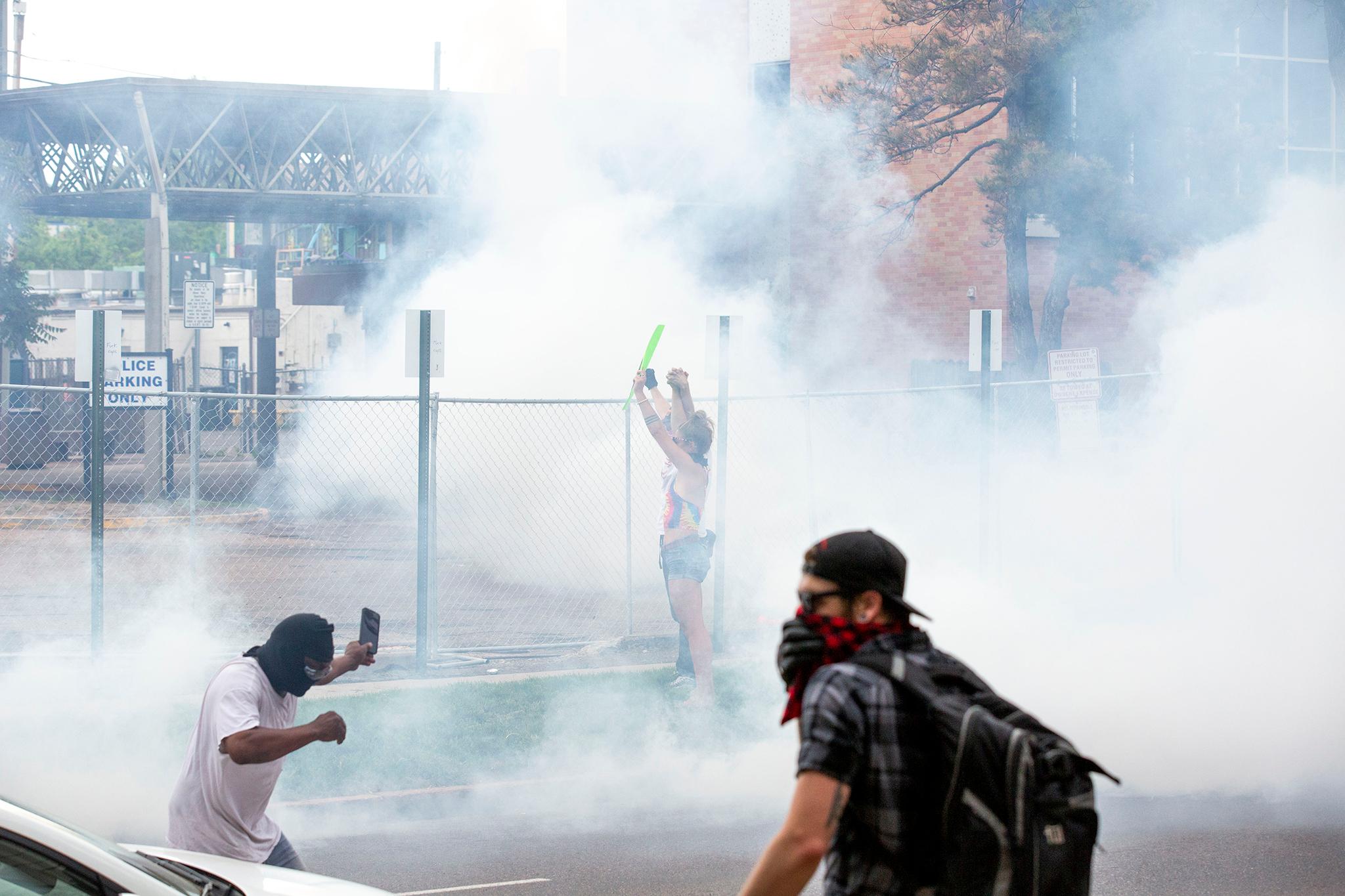A jury has ordered the city of Denver to pay 12 protesters $14 million in damages over the Denver Police Department's response to rallies following the murder of George Floyd in 2020.
After five hours of deliberation on Friday, the eight-member panel found that practices and policies at the department's highest level led officers to deploy tear gas, pepper balls and other weapons against peaceful demonstrators. Their actions violated the plaintiffs' first and, in some cases, fourth amendment rights.
"This was, as far as I know, the first case of George Floyd protestors injured by police to go to trial around the country," said Tim Macdonald, an attorney for the plaintiffs. "So hopefully what police departments will take from this is that a jury of regular citizens took these rights very seriously. And they're prepared to tell the police what they did to peaceful protestors is not acceptable."
Plaintiffs testified that the officers left them physically and emotionally traumatized. Following the verdict's reading, the group sobbed and hugged each other outside of the Alfred A. Arraj United States Courthouse.
"When we say this can't happen again, we mean both what the police did to us, but also the underlying police brutality which is why we had to take the streets," said Elisabeth Epps, one of the plaintiffs in the case. Police shot Epps with pepper balls as she was peacefully crossing the street during the demonstrations.
Throughout the three-week federal trial, plaintiffs' attorneys pointed to shoddy record keeping, a failure to issue dispersal orders and other missteps as catalysts that led to their clients being mistreated. The department suffered a total "leadership failure," during the demonstrations, according to officers quoted in DPD memos used as evidence.
The city issued a statement in response to the verdict, indicating that it will continue to review how law enforcement groups respond to protests. The statement did acknowledge that officers made mistakes in certain incidents.
"We continue to evaluate our policies and training to ensure we are using best practices identified by law enforcement throughout the country to better protect peaceful protestors while addressing those who are only there to engage in violence," the statement said.
Witnesses included plaintiffs, the city's former independent monitor and more than a dozen former and current Denver police officers, as well as multiple law enforcement experts. City attorneys argued that the department was acting in the best interest of public safety when officers used force against protesters.
In her closing arguments Friday, the city's lead defense attorney, Lindsay Jordan, said the department had never faced anything like the 2020 protests.
"This was like preparing for cold and flu season, and COVID hits," Jordan said. "This was not a simple case of mostly peaceful protestors subjected to chemical munitions because a few bad actors were in the crowd. Nothing about the George Floyd protests was simple."
Still, DPD should have been able to distinguish between violent demonstrators and peaceful ones when deploying tear gas, pepper balls and other crowd control weapons, Macdonald said in his closing argument.
"The force was unreasonable," he said. "There was no reason to use force on a single one of our plaintiffs in a single incident, and our clients suffered physical or emotional injury because of it."
The defense is expected to appeal the ruling, which means it may head to a higher federal court in the coming months.
Outside of the monetary damages awarded to plaintiffs, District Judge R. Brooke Jackson could still order specific policy changes within the department through a process known as injunctive relief.
Most plaintiffs are expected to individually receive $1 million from the city. One plaintiff who experienced a severe head injury will receive $3 million in damages.
Epps will receive an additional $250,000 in punitive damages related to allegations against one specific officer.
The verdict is likely to carry weight in future civil rights cases stemming from the protests, including others in Denver, said Jason Williamson, executive director of NYU's Center on Race, Inequality, and the Law, which tracks cases like the one in Denver.
"I would imagine that litigators around the country will use a victory in this case as fodder for their arguments going forward," Williamson said.
But the ruling also carries symbolic weight, he added.
"I think people are finally starting to grapple with law enforcement as a concept generally and even the fact that we're having a conversation about reimagining what it means to do law enforcement in this country," Williamson said. "I think that shows there are lasting effects from the protests."
Many plaintiffs agreed.
"This was a victory," said Stanford Smith, who left the protests in 2020 after police pepper sprayed him in the face. "But we are very far from a society where our Black and brown neighbors are safe from brutality and anyone who is happy and excited and hopeful in the wake of this verdict should take that energy and do something to end police brutality in Denver and everywhere in this country."
The payout adds to the city's growing price tag for DPD's excessive use of force during the protests.
Last month, Denver City Council unanimously approved settlements with two protesters without going to trial. Denver has spent more than $15 million settling claims to date.












